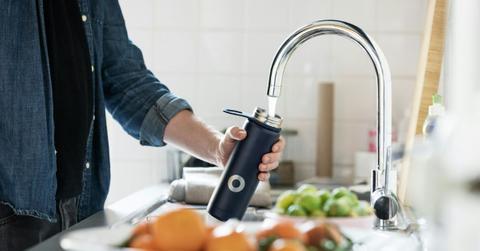Hidden Hazard: CDC Warns Deadly Bacterial Infections Lurking in This Household Source

Recent findings by the CDC may leave you feeling uneasy about your tap water.
Recent findings may leave you feeling uneasy about your tap water.
New data released by the Centers for Disease Control and Prevention reveals a troubling trend: between 2015 and 2020, there were 214 outbreaks of enteric diseases associated with drinking water, leading to over 2,000 reported cases of illness.
These outbreaks, caused by pathogens like E. coli, campylobacter and shigella, primarily occurred in public water systems, accounting for 80% of the cases.
Among these waterborne illnesses, legionella, a bacteria commonly found in biofilm, emerged as the primary culprit behind public water system outbreaks. Legionella poses a significant threat, capable of causing severe conditions like Legionnaires’ disease.
The prevalence of concerning elements in our water, including "forever chemicals," microplastics and toxic contaminants like arsenic, uranium and lead, raises questions about the safety of tap water.
Dr. Linda Yancey, Director of Infection Prevention at Houston’s Memorial Hermann Health System, acknowledges that while water in the U.S. is typically deemed safe, untreated tap water may not be the ideal choice for certain uses.
She emphasizes the importance of considering how tap water is utilized, cautioning against its use in devices like neti pots, CPAP machines and humidifiers.
Dr. Yancey explains that while our bodies possess natural defenses against many waterborne pathogens, using tap water in ways that bypass these defenses can lead to health complications.
- What Lies Beneath: NASA Scientist Believes Aliens May Have Found 'Perfect' Hiding Spot in Earth's Oceans
- Global Threat: Russia Insider Warns West of 'World War Using Nuclear Weapons' Amid Escalating Support for Ukraine
- Countdown to Disaster? Ex-NATO Official Warns Russia, Iran and China Could Wage WWIII in Just Years
For instance, using tap water in CPAP machines and humidifiers can introduce water directly into the lungs, potentially causing pneumonia. Nasal irrigation carries a risk of amebic infection due to the water's contact with nerves leading to the brain.
A Florida resident died of a rare "brain-eating" infection last year after using unboiled tap water for nasal rinsing, highlighting the severity of the risks associated with untreated water.
Furthermore, experts advise against using tap water for wound cleaning, contact lens care or preparing infant formula due to the heightened risk of infection, especially for vulnerable populations like infants.
Never miss a story — sign up for the Front Page Detectives newsletter. Be on the scene the moment news breaks.
Dr. Rianna Murray, an assistant research professor at the University of Maryland, underscores the importance of awareness regarding water quality risks, particularly in regions with consistently good water quality where awareness might be lacking.
To mitigate risks, health officials recommend boiling tap water for at least one minute before use or employing filters designed to remove common contaminants.
Regular reporting of any changes in water appearance, taste or odor to water utility authorities is also encouraged. Additionally, individuals relying on private water systems, such as wells, are urged to arrange for inspections to ensure water safety and compliance with regulations.
Become a Front Page Detective
Sign up to receive breaking
Front Page Detectives
news and exclusive investigations.
